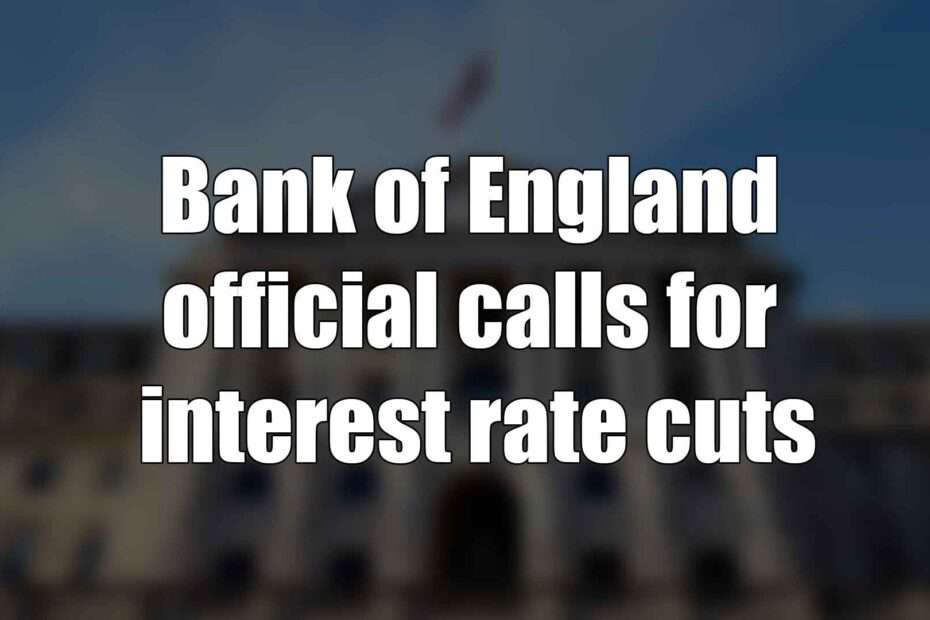Bank of England official calls for interest rate cuts
Monetary Policy Committee Member Advocates Six Interest Rate Reductions in 2025 to Counter Economic Slowdown Following Inflation Decline
A senior Bank of England policymaker delivered a stark assessment yesterday evening, suggesting that interest rates might need to be reduced up to six times throughout the current year to prevent the economy from sliding into recession, particularly as the Labour government’s employment taxation measures begin to affect the markets.
Professor Alan Taylor, who serves on the Bank’s influential Monetary Policy Committee, delivered a comprehensive speech at Leeds University, emphasising that “with the economy displaying signs of weakness, it is imperative that we guide interest rates back towards more conventional levels to achieve an economic soft landing”. His remarks came amid growing concerns about Britain’s economic trajectory.
The financial markets received welcome news yesterday as inflationary pressures showed signs of easing on both sides of the Atlantic, providing a much-needed boost to market confidence and offering temporary relief to the embattled Chancellor of the Exchequer, Rachel Reeves, who has faced mounting criticism over her handling of the economy.
According to the Office for National Statistics, British inflation demonstrated an unexpected downward movement, declining from 2.6 per cent in November to 2.5 per cent in December, surpassing most economists’ forecasts. Across the Atlantic, whilst American inflation experienced a modest rise from 2.7 per cent to 2.9 per cent, the underlying indicators proved more encouraging than anticipated, suggesting a broader trend of price stabilisation.
In his detailed analysis, Taylor expressed cautious optimism, noting that Britain was “in the final stretch” of its challenging journey to restore inflation to the Bank’s mandated 2 per cent target. However, he tempered this assessment with concerns about the broader economic picture.
The British economy has struggled to maintain momentum in recent months. Today’s anticipated economic data is expected to reveal a modest GDP growth of 0.2 per cent for November, following two consecutive months of economic contraction in September and October, highlighting the fragility of the recovery.
Taylor’s assessment of the situation was measured but concerning. “Whilst I do not currently anticipate a recession as our base case scenario, we must acknowledge that the probability of such an outcome has become increasingly significant,” he explained. “In the current climate, I believe implementing pre-emptive rate reductions represents a prudent strategy to safeguard against this shifting balance of risks.”
The economist, who was amongst three committee members advocating for a rate reduction during December’s meeting, highlighted the mounting pressures facing both households and businesses. He pointed to a “significant cashflow constraint” emerging from the recent National Insurance contribution increases and the continued impact of previous interest rate rises working their way through the economy.
Speaking to academics and business leaders in Leeds, Taylor described what he termed a “grinding hand-to-mouth logic” affecting economic decision-making. “During challenging periods – times characterised by uncertainty or pessimism, when market sentiment is subdued, when taking on additional debt or utilising savings appears excessively risky or unfeasible – income and expenditure must necessarily achieve a precise balance. Both households and businesses are adopting increasingly cautious financial planning approaches,” he elaborated.
Taylor’s baseline projection envisions a cumulative reduction of 100 basis points – equivalent to one percentage point – in interest rates over the course of 2025, bringing the rate down from its current level of 4.75 per cent to 3.75 per cent. However, he warned that a deteriorating economic outlook might necessitate “a more aggressive reduction schedule, potentially requiring cuts of 125 or 150 basis points within the coming twelve months”.
Such a trajectory would reduce the Bank rate to 3.25 per cent by December, representing a significantly more rapid decrease than current market expectations. Following yesterday’s developments, market participants adjusted their positions, with trading activity now indicating expectations of between two and three quarter-point reductions throughout 2025.
The inflation data provided a notable boost to the struggling bond markets in both the United Kingdom and United States. The yields on British government bonds – commonly referred to as gilts – which represent the government’s borrowing costs and move inversely to bond prices, experienced significant movement. These yields had risen considerably since the beginning of the year, initially driven by concerns regarding the American economy before evolving into broader apprehension about the Labour government’s economic management.
Yesterday’s trading saw yields on 10-year gilts decline from 4.9 per cent to 4.7 per cent, offering some respite to government borrowing costs. However, financial analysts have cautioned that the recent decline in inflation might prove temporary, with several experts suggesting that the rate could potentially climb to 3 per cent in the coming months.
The broader implications of these developments continue to reverberate through the British economy, as policymakers attempt to balance the competing demands of controlling inflation whilst supporting economic growth during a period of considerable uncertainty.

